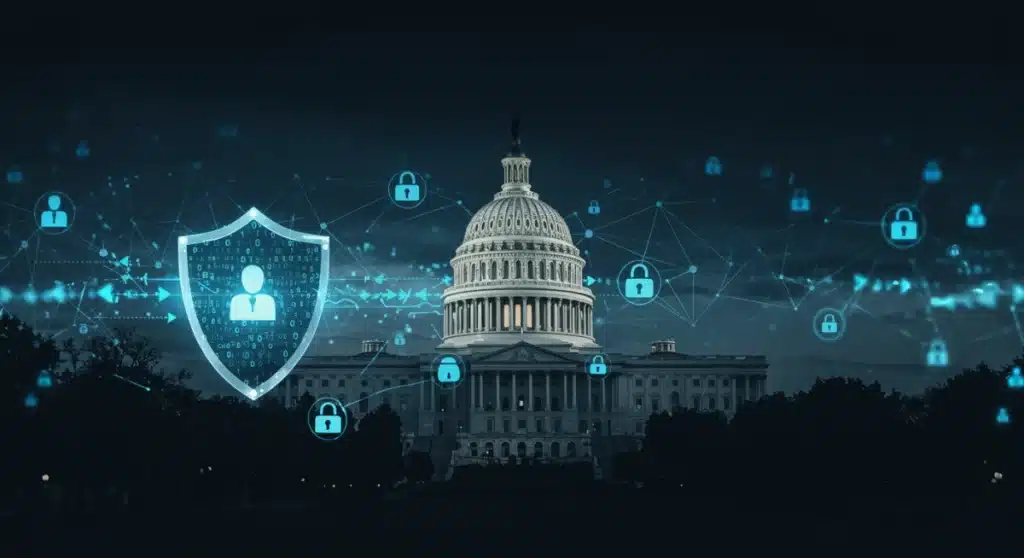Recent Updates to Federal Privacy Policies in 2025: What Every U.S. Citizen Needs to Know Now

Recent federal privacy policy updates for 2025 are poised to significantly alter how personal data is collected and used, directly impacting U.S. citizens’ digital rights and corporate data handling practices, necessitating immediate awareness.
The landscape of digital privacy in the United States is undergoing a significant transformation. As of early 2025, a series of comprehensive Recent Updates to Federal Privacy Policies in 2025: What Every U.S. Citizen Needs to Know Now are set to redefine how personal data is collected, processed, and protected. This breaking news impacts every American citizen and business operating within the nation’s borders, demanding immediate attention and understanding.
Understanding the New Federal Privacy Framework
The U.S. government is enacting a new federal privacy framework in 2025, aiming to standardize data protection across various sectors. This move comes after years of fragmented state-level regulations and growing public concerns over data breaches and misuse of personal information. The overarching goal is to provide a unified approach to consumer privacy rights.
These updates introduce several key provisions designed to empower consumers and place stricter obligations on companies handling personal data. The framework seeks to balance innovation with individual privacy, a challenge that has long plagued digital policy debates. As of the latest reports, implementation dates are firm, with most provisions taking effect by mid-2025.
Key Provisions of the New Legislation
The newly enacted legislation includes several critical provisions that will shape the future of data privacy. These measures are designed to grant individuals more control over their personal information and hold organizations accountable for data stewardship.
- Data Minimization Requirements: Companies must now collect only the data strictly necessary for their stated purpose, reducing the overall volume of personal information held.
- Enhanced Consent Mechanisms: Explicit and informed consent will be required for specific data processing activities, moving away from implied consent models.
- Universal Opt-Out Rights: Citizens will have a federally mandated right to opt-out of data sales and targeted advertising across all platforms and services.
- Data Portability Rights: Individuals can request their personal data in a portable format, allowing for easier transfer between services.
Impact on Businesses: Compliance and Challenges
The new federal privacy policies present both significant compliance hurdles and strategic opportunities for businesses. Organizations, regardless of size, must re-evaluate their data handling practices, privacy policies, and security protocols to align with the updated regulations. Non-compliance carries substantial penalties, including hefty fines and reputational damage.
Many companies are already initiating internal audits and engaging privacy consultants to prepare for the 2025 deadline. The shift from a patchwork of state laws to a unified federal standard is expected to streamline compliance for multi-state operations, yet it also demands a thorough overhaul for many.
Operational Changes Required for Compliance
Businesses must undertake several operational changes to ensure compliance with the new federal privacy rules. This includes revising internal policies, updating technological infrastructure, and training employees on new data handling procedures. The scope of these changes is broad, affecting everything from customer onboarding to data analytics.
- Privacy Policy Revisions: All public-facing privacy policies must be updated to clearly reflect the new rights granted to consumers and the company’s data practices.
- Data Mapping and Inventory: Companies need to accurately map where personal data is stored, how it flows, and who has access to it within their systems.
- Security Enhancements: Robust security measures must be implemented to protect personal data from unauthorized access, breaches, and cyber threats.
- Employee Training: Comprehensive training programs are essential to ensure all staff understand their roles and responsibilities in upholding data privacy.
New Rights for U.S. Citizens: What You Can Do
For U.S. citizens, the Recent Updates to Federal Privacy Policies in 2025: What Every U.S. Citizen Needs to Know Now usher in an era of unprecedented control over personal data. These new rights are designed to give individuals greater transparency and agency regarding how their information is used by corporations and other entities.
Understanding these rights is the first step toward exercising them effectively. Citizens will have the power to make informed decisions about their digital footprint, ranging from controlling marketing preferences to requesting data deletion. This represents a significant shift from previous, more limited consumer protections.
Exercising Your Enhanced Privacy Privileges
The new policies empower citizens with a range of tools to manage their data. Proactive engagement with these tools is crucial for safeguarding personal information in an increasingly digital world. These rights are not automatically applied; individuals must often take steps to activate them.
- Access and Correction Requests: You can request access to the personal data a company holds about you and ask for corrections to inaccurate information.
- Deletion Rights: You have the right to request that companies delete your personal data under certain conditions.
- Opt-Out of Data Sales: A universal mechanism will allow you to easily opt-out of the sale of your personal data to third parties.
- Restrictions on Targeted Advertising: New controls will enable you to limit or prevent companies from using your data for personalized ads.
Enforcement and Regulatory Oversight
A critical component of the Recent Updates to Federal Privacy Policies in 2025: What Every U.S. Citizen Needs to Know Now is the establishment of robust enforcement mechanisms. The federal government is allocating significant resources to agencies responsible for overseeing compliance and penalizing violations. This ensures that the new regulations have real teeth and are not merely symbolic.
The Federal Trade Commission (FTC) and state attorneys general are expected to play leading roles in enforcement. There will also be provisions for individual private right of action in certain circumstances, allowing citizens to seek legal recourse for privacy violations. This multi-pronged approach aims to create a strong deterrent against non-compliance.

Penalties for Non-Compliance
Businesses failing to adhere to the new federal privacy policies face severe consequences. The penalties are designed to be substantial enough to compel compliance and deter future infringements. These can include financial penalties and legal injunctions, potentially impacting a company’s operations and financial stability.
- Monetary Fines: Significant financial penalties will be levied for each violation, potentially escalating for repeated or egregious breaches.
- Corrective Actions: Companies may be ordered to implement specific corrective measures to address privacy deficiencies.
- Public Disclosure: Violations may result in public disclosure, leading to severe reputational damage and loss of consumer trust.
- Legal Action: In some cases, individuals or state entities may pursue legal action against non-compliant organizations.
The Broader Implications for the Digital Economy
The Recent Updates to Federal Privacy Policies in 2025: What Every U.S. Citizen Needs to Know Now extend beyond individual rights and corporate compliance; they will reshape the entire digital economy. Industries reliant on data-driven models, such as advertising, tech, and e-commerce, are bracing for significant shifts in their operational strategies. The move towards greater privacy could foster new business models focused on privacy-by-design principles.
Experts anticipate a period of adjustment as companies innovate to adapt to the new rules while maintaining competitive advantages. The legislation could also influence international data transfer agreements, aligning U.S. standards more closely with global privacy benchmarks like the GDPR. This could facilitate more seamless data flows with privacy-conscious regions.
Innovation and Consumer Trust
While the initial focus for many businesses will be on compliance, the long-term implications include fostering greater innovation and building enhanced consumer trust. Companies that prioritize privacy may gain a competitive edge as consumers increasingly value transparent and responsible data handling. This can lead to a more ethical digital ecosystem.
The new policies encourage the development of privacy-enhancing technologies and services. This could spur innovation in areas like secure data processing, anonymous analytics, and privacy-preserving AI. Ultimately, a stronger privacy framework can lead to a more trusted and sustainable digital environment for everyone.
Public Awareness and Education Initiatives
A crucial aspect of the successful implementation of the Recent Updates to Federal Privacy Policies in 2025: What Every U.S. Citizen Needs to Know Now is widespread public awareness and education. The government, along with consumer advocacy groups, is launching initiatives to inform citizens about their new rights and how to exercise them. These campaigns are vital to ensuring that the policies achieve their intended impact.
Educational materials, online resources, and public service announcements are being rolled out nationwide. The goal is to demystify complex legal language and present actionable information that empowers individuals to take control of their personal data. This proactive approach aims to bridge the knowledge gap between policy makers and the general public.
These initiatives will cover various platforms, including social media, traditional news outlets, and community workshops. The emphasis is on accessibility, ensuring that information reaches diverse populations across the country. Understanding these changes is not just about compliance for businesses; it’s about empowering every individual.
| Key Point | Brief Description |
|---|---|
| New Federal Framework | Standardized data protection across the U.S. with unified consumer privacy rights. |
| Enhanced Citizen Rights | Includes data access, deletion, opt-out of sales, and targeted advertising restrictions. |
| Business Compliance | Mandatory operational changes, policy revisions, and security enhancements for all companies. |
| Stronger Enforcement | FTC and state attorneys general to enforce compliance with significant penalties for violations. |
Frequently Asked Questions About 2025 Privacy Policies
The 2025 policies introduce a unified federal standard for data privacy, granting U.S. citizens enhanced rights over their personal data, including universal opt-out options, data access, and deletion rights, while imposing stricter data handling requirements on businesses nationwide.
You will gain more control over how companies collect, use, and share your data. This includes the ability to easily opt-out of targeted advertising and data sales, request access to your data, and demand its deletion under specific circumstances, enhancing your digital privacy.
Businesses must implement data minimization, obtain explicit consent for data processing, revise privacy policies, enhance security measures, and conduct regular data mapping. Non-compliance can lead to substantial financial penalties and legal repercussions from federal agencies.
Most provisions of the new federal privacy policies are scheduled to take full effect by mid-2025. Businesses and citizens are advised to prepare for these changes now, as enforcement mechanisms will be active shortly after the implementation dates.
The federal government and various consumer advocacy groups are launching public awareness campaigns. Official government websites, consumer protection agencies like the FTC, and reputable privacy organizations will provide detailed guides and resources to help citizens understand and exercise their new rights.
What Happens Next
The implementation of the Recent Updates to Federal Privacy Policies in 2025: What Every U.S. Citizen Needs to Know Now marks a pivotal moment for digital rights and corporate accountability in the U.S. As these policies solidify, the coming months will see accelerated efforts from businesses to achieve compliance and from regulatory bodies to establish clear enforcement precedents. Citizens should remain vigilant and proactively engage with the new tools and rights afforded to them. Expect ongoing public education campaigns and potential legal challenges as the new framework is tested in practice, shaping the future of data privacy for years to come.





